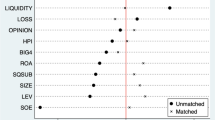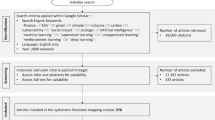Abstract
A policy of effective environmental protection, inthe present political atmosphere, will requirelow-cost monitoring and enforcement (M&E) strategiesthat do not rely on draconian penalties. Infinite oreven very high penalties for environmental violationsare socially and politically unacceptable.Environmental violations are often classed as civiloffenses, and the occurrence of a violation may bethought insufficient to establish intent. If penaltiesare upper-bounded and each firm is inspected randomly,compliance cannot be maintained with arbitrarily smallinspection probabilities and, hence, small agencycosts. In this paper we examine possibilities forreducing agency M&E costs, including the requirementfor self-reports of effluents and the adjustment ofthe inspection probability to reflect a firm'scompliance or reporting reputation.
Similar content being viewed by others
References
Greenberg, J. (1984), ‘Avoiding Tax Avoidance: A (Repeated) Game-Theoretic Approach’, Journal of Economic Theory 32(1), 1-13.
Harford, J. D. (1987), ‘Self-Reporting of Pollution and the Firm's Behavior Under Imperfectly Enforceable Regulations’, Journal of Environmental Economics and Management 14, 293-303.
Harrington, W. (1988), ‘Enforcement Leverage when Penalties Are Restricted’, Journal of Public Economics 37, 29-53.
Hentschel, E., A. Randall and M. J. Miranda (1995), Enforcing Pollution Control Regulation Using Two Types of Inspections, a Reputation Indicator and Self-Reports. Selected Paper, American Agricultural Economics Association Annual Meeting, Indianapolis, August 6–9.
Jones, C. A. (1989), ‘Standard Setting with Incomplete Enforcement Revisited’, Journal of Policy Analysis and Management 8(1), 72-87.
Kaplow, L. and S. Shavell (1994), ‘Optimal Law Enforcement with Self-Reporting of Behavior’, Journal of Political Economy 102(3), 583-606.
Lancaster, L. M. et al. (1993), Performance, Economic, and Environmental Impacts associated with Alternative Pulping and Bleaching Processes. International Paper, Mobile, Alabama.
Landsberger, M. and I. Meilijson (1982), ‘Incentive Generating State Dependent Penalty System’, Journal of Public Economics 19, 333-352.
Magat, W. A. and W. K. Viscusi (1990), ‘Effectiveness of the EPA's Regulatory Enforcement: The Case of industrial Effluent Standards’, Journal of Law and Economics 33, 331-360.
Malik, A. S. (1993), ‘Self-Reporting and the Design of Policies for Regulating Stochastic Pollution’, Journal of Environmental Economics and Management 24, 241-257.
Posner, R. A. (1992), Economic Analysis of Law, 4th edn. Boston: Little, Brown and Company.
Russell, C. S., W. Harrington and W. J. Vaughan (1986), Enforcing Pollution Control Laws. Washington, D.C.: Resources for the Future.
Russell, C. S. (1990), ‘Game Models for Structuring Monitoring and Enforcement Systems’, Natural Resource Modeling 4(2), 143-173.
Russell, C. S. (1992), ‘Monitoring and Enforcement of Pollution Control Laws in Europe and the United States’, in Rüdiger Pethig, ed., Conflicts and Cooperation in Managing Environmental Resources. Berlin: Springer Verlag, pp. 195-213.
Welsch, H. (1992), Comment to ‘Monitoring and Enforcement of Pollution Control Laws in Europe and the United States’, in Rüdiger Pethig, ed., Conflicts and Cooperation in Managing Environmental Resources. Berlin: Springer Verlag, pp. 213-219.
Author information
Authors and Affiliations
Rights and permissions
About this article
Cite this article
Hentschel, E., Randall, A. An Integrated Strategy to Reduce Monitoring and Enforcement Costs. Environmental and Resource Economics 15, 57–74 (2000). https://doi.org/10.1023/A:1008348915460
Issue Date:
DOI: https://doi.org/10.1023/A:1008348915460




